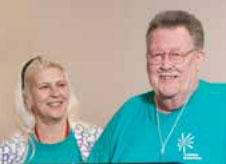Vietnam veteran and accomplished businessman William V. Larsen reclaims his quality of life through Pulmonary Rehabilitation at Robert Wood Johnson University Hospital Rahway.

THE SHORTNESS OF breath began in 1968, a possible side effect from one year of exposure to Agent Orange and napalm during the Vietnam War.
As a member of the 101st Airborne Division, William V. Larsen had spent many evenings sleeping on the ground during his year of combat in the jungles and mountains of Southeast Asia from 1965 to 1966. Two years later, he started to feel the effects.
“I would lose my breath playing basketball,” Mr. Larsen says. “But it didn’t interfere with my day-to-day activities until several years later.”
Mr. Larsen spent years managing businesses and traveling the world, but his health challenges finally caught up with him in 2006.
“My wife, Ginny, found me in the living room unable to breathe,” says Mr. Larsen, who was transferred to a local hospital for emergency treatment. “I spent 19 days in a medically induced coma and woke up with a tube in my throat, which remained for two weeks. It was one of the most frightening experiences of my life.”
WORKING TO HEAL
Mr. Larsen spent the next several years battling a variety of health conditions in addition to the breathing problems, which were indicative of chronic obstructive pulmonary disease, otherwise known as COPD.
After surviving heart disease and lung difficulties, Mr. Larsen was left fatigued and reliant on the use of a wheelchair, unable to take 10 steps without experiencing pulmonary distress. So he decided to take action.
Mr. Larsen enrolled in the Pulmonary Rehabilitation program at RWJ Rahway in February 2015 and has been thrilled with the results he has seen since collaborating with registered respiratory therapist Paula Erickson, RRT.
“My wife found the program online, and it was a great fit,” Mr. Larsen says. “Paula is an angel, and my quality of life has improved immensely. She has taught me breathing techniques and control that have virtually changed the quality of my life for the better. I’ve lost weight and a ton of depression, and gained strength and self-confidence.”
“He has come out of his comfort zone and is so motivated,” Ms. Erickson says. “He is a wonderful example of what people can achieve through the Pulmonary Rehabilitation program. We have solutions to help you or your loved one breathe better.”